Standard: Difference between revisions
m (Fixed the starting date and set for rotation) |
(total rewrite) |
||
| Line 1: | Line 1: | ||
'''Standard''' format, in contemporary use, is a format including all cards from sets 7 ([[Return of the King]]) to the final set ([[Age's End]]), as well as most [[Promotional]] cards, such as the [[Weta Collection]] and reprints from those sets, except for cards on the [[X-list]]. This includes cards from [[King Block]], [[War of the Ring Block]], and [[Hunters Block]]. The format uses the Shadows-style [[Site|site path]], allowing [[Site#List of War of the Ring Block Sites|site cards from War of the Ring Block]] and [[Site#List of Hunters Block Sites|Hunters Block]]. This format includes all rule changes made by Decipher, including the site changes and the rule against [[Skirmish Cancellation|cancelling]] the [[ring-bearer]]'s skirmishes. The full rules were consolidated in [[Comprehensive Rules 4.0]] and the [[Current Rulings Document]]. | |||
Standard is no longer the actual standard for LOTR TCG play. While Standard was the primary official format supported by [[Decipher]] until the end of the game, today it is no longer the most popular [[format]] for tournaments, leagues, and casual play, either offline or on online recreations like [[GEMP]] or [[mLOTRO]]. Today, Standard is less popular than the similar but more-inclusive [[Expanded]], as well as a number of historical snapshots of Standard that include only earlier sets and earlier versions of the rules. | |||
Historically, Decipher's official "standard" tournament format was officially defined with the release of [[The Two Towers]], which introduced a new site path, rendering the [[site]] cards (and a number of cards that interacted with them) from [[Fellowship Block]] obsolete. This definition soon also included the [[X-list]], which banned certain [[overpowered]] or [[NPE|exceptionally obnoxious]] cards from tournament play. Except for the obsolete sites and the X-list, Standard included all of the cards released to date up until the 12th set. When [[Black Rider]] was released in 2005, Decipher began [[Rotation|rotating out]] older sets in order to keep the card population fresh, similar to other TCGs like ''Magic: the Gathering''. This was not a popular change with players who preferred to use those older cards. | |||
Today, some of the most popular formats are "snapshots" of older versions of Standard. They include all cards released up to some cutoff point (usually the end of a [[Block]]), with the exception of obsolete sites and X-listed cards. They also often use historical versions of the rules, without rule changes that were made to accommodate later cards. They stand in contrast to [[Block]] formats, which only include cards from a block of about three sets released (more or less) one after another. (However, some of the historical standard formats are named "Block" anyway for historical reasons, just to make things confusing.) These formats include: | |||
* [[Fellowship Block]], which includes sets up to [[Realms of the Elf Lords]] and uses the [[Site#List of Fellowship Block Sites|Fellowship Block site path]]. It uses the original rules except in that it includes the [[Rule of 4]]. The ring-bearer's [[Skirmish Cancellation|skirmishes can be cancelled]]. This format technically predates Standard, but works similarly. It's also the only historical standard that is also a block format, since blocks were introduced to LOTR TCG afterward. This is one of the most popular historical formats; it's far and away the most popular casual format on [[GEMP]], for example. | |||
* [[Towers Standard]], which includes sets up to [[Ents of Fangorn]] and uses the [[Site#List of Towers Block Sites|Towers Block site path]]. This format adds the [[culture token]] and [[ring-bound]]/[[unbound]] rules. The ring-bearer's skirmishes can be cancelled. This is not a popular format in general, much less than Fellowship Block or Movie Block, but it does have enthusiasts, and it's more popular than the post-Shadows Standard formats. | |||
* [[King Standard]], which includes sets up to [[Return of the King]] and uses the [[Site#List of King Block Sites|King Block site path]] but including only the sites from set 7. This format adds the [[initiative]] and [[threat]] rules, but the ring-bearer's skirmishes can still be cancelled. This somewhat non-standard "standard" format lands in the middle of a block, and was founded by players who were unhappy with [[power creep]] in later sets in that block. This format is supported with tournaments in the French community, as well as on [[GEMP]] and [[The Last Homely House]] forums. ([[mLOTRO]] doesn't support a 1-7 format, but has a similar format, called "Early King Standard", that includes sets 1-8.) | |||
* [[Movie Block]], which includes sets up to [[Mount Doom]] and uses the [[Site#List of King Block Sites|King Block site path]]. This format also adds the [[initiative]] and [[threat]] rules, but the ring-bearer's skirmishes no longer be cancelled. The name is misleading: this isn't a Block format, but rather a historical snapshot of Standard. (Indeed, this format is instead called "King Standard" on [[mLOTRO]].) The changes made in the next set, [[Shadows]], both to the whole game and to the tournament standards shortly thereafter, were divisive enough to mark this as the most inclusive of the "old" formats, with anything coming after as a "new" format. Movie Block remains fairly popular to this day in general, and it is the second-most popular format on [[GEMP]]. | |||
* [[War of the Ring Standard]], which includes sets from set 4, [[The Two Towers]], to set 14, [[Expanded Middle Earth]]. This set uses the new numberless sites first introduced in [[Shadows]], and only allows [[Site#List of War of the Ring Block Sites|sites from War of the Ring Block]]. The changes to the site path are the largest rule change made for this format. This format is very unpopular: the changes to sites, Shadow [[culture]]s, and set rotation have a lot of detractors, and there's a very noticeable amount of [[power creep]]. Those players who do appreciate those changes for what they are generally play [[Expanded]] (or occasionally Standard) instead. | |||
* '''Standard''', which includes all cards from sets 7 to 19 and is described in this article. It's most popular among players who enjoy [[Expanded]] but would rather not deal with {{C|Orc}} strategies using {{Card|Demoralized}} or the {{Card|Madril, Defender of Osgiliath}} / {{Card|Ithilien Blade}} combo. | |||
== X-List == | == X-List == | ||
''For the X-list in historical versions of [[Standard]], see [[X-list]] or the articles for those formats.'' | |||
The last [[Current Rulings Document]] defined the [[X-List]] for Standard Format as follows: | The last [[Current Rulings Document]] defined the [[X-List]] for Standard Format as follows: | ||
* All cards in sets 1-6, including Promotional cards originally printed in those sets | * All cards in sets 1-6, including [[Promotional]] cards originally printed in those sets | ||
* {{Card|Steadfast Champion}} | * {{Card|Steadfast Champion}} | ||
* {{Card|Aggression}} | * {{Card|Aggression}} | ||
| Line 22: | Line 32: | ||
* {{Card|Madril, Defender of Osgiliath}} | * {{Card|Madril, Defender of Osgiliath}} | ||
---- | |||
{{Format Table}} | {{Format Table}} | ||
Revision as of 04:47, 13 March 2022
Standard format, in contemporary use, is a format including all cards from sets 7 (Return of the King) to the final set (Age's End), as well as most Promotional cards, such as the Weta Collection and reprints from those sets, except for cards on the X-list. This includes cards from King Block, War of the Ring Block, and Hunters Block. The format uses the Shadows-style site path, allowing site cards from War of the Ring Block and Hunters Block. This format includes all rule changes made by Decipher, including the site changes and the rule against cancelling the ring-bearer's skirmishes. The full rules were consolidated in Comprehensive Rules 4.0 and the Current Rulings Document.
Standard is no longer the actual standard for LOTR TCG play. While Standard was the primary official format supported by Decipher until the end of the game, today it is no longer the most popular format for tournaments, leagues, and casual play, either offline or on online recreations like GEMP or mLOTRO. Today, Standard is less popular than the similar but more-inclusive Expanded, as well as a number of historical snapshots of Standard that include only earlier sets and earlier versions of the rules.
Historically, Decipher's official "standard" tournament format was officially defined with the release of The Two Towers, which introduced a new site path, rendering the site cards (and a number of cards that interacted with them) from Fellowship Block obsolete. This definition soon also included the X-list, which banned certain overpowered or exceptionally obnoxious cards from tournament play. Except for the obsolete sites and the X-list, Standard included all of the cards released to date up until the 12th set. When Black Rider was released in 2005, Decipher began rotating out older sets in order to keep the card population fresh, similar to other TCGs like Magic: the Gathering. This was not a popular change with players who preferred to use those older cards.
Today, some of the most popular formats are "snapshots" of older versions of Standard. They include all cards released up to some cutoff point (usually the end of a Block), with the exception of obsolete sites and X-listed cards. They also often use historical versions of the rules, without rule changes that were made to accommodate later cards. They stand in contrast to Block formats, which only include cards from a block of about three sets released (more or less) one after another. (However, some of the historical standard formats are named "Block" anyway for historical reasons, just to make things confusing.) These formats include:
- Fellowship Block, which includes sets up to Realms of the Elf Lords and uses the Fellowship Block site path. It uses the original rules except in that it includes the Rule of 4. The ring-bearer's skirmishes can be cancelled. This format technically predates Standard, but works similarly. It's also the only historical standard that is also a block format, since blocks were introduced to LOTR TCG afterward. This is one of the most popular historical formats; it's far and away the most popular casual format on GEMP, for example.
- Towers Standard, which includes sets up to Ents of Fangorn and uses the Towers Block site path. This format adds the culture token and ring-bound/unbound rules. The ring-bearer's skirmishes can be cancelled. This is not a popular format in general, much less than Fellowship Block or Movie Block, but it does have enthusiasts, and it's more popular than the post-Shadows Standard formats.
- King Standard, which includes sets up to Return of the King and uses the King Block site path but including only the sites from set 7. This format adds the initiative and threat rules, but the ring-bearer's skirmishes can still be cancelled. This somewhat non-standard "standard" format lands in the middle of a block, and was founded by players who were unhappy with power creep in later sets in that block. This format is supported with tournaments in the French community, as well as on GEMP and The Last Homely House forums. (mLOTRO doesn't support a 1-7 format, but has a similar format, called "Early King Standard", that includes sets 1-8.)
- Movie Block, which includes sets up to Mount Doom and uses the King Block site path. This format also adds the initiative and threat rules, but the ring-bearer's skirmishes no longer be cancelled. The name is misleading: this isn't a Block format, but rather a historical snapshot of Standard. (Indeed, this format is instead called "King Standard" on mLOTRO.) The changes made in the next set, Shadows, both to the whole game and to the tournament standards shortly thereafter, were divisive enough to mark this as the most inclusive of the "old" formats, with anything coming after as a "new" format. Movie Block remains fairly popular to this day in general, and it is the second-most popular format on GEMP.
- War of the Ring Standard, which includes sets from set 4, The Two Towers, to set 14, Expanded Middle Earth. This set uses the new numberless sites first introduced in Shadows, and only allows sites from War of the Ring Block. The changes to the site path are the largest rule change made for this format. This format is very unpopular: the changes to sites, Shadow cultures, and set rotation have a lot of detractors, and there's a very noticeable amount of power creep. Those players who do appreciate those changes for what they are generally play Expanded (or occasionally Standard) instead.
- Standard, which includes all cards from sets 7 to 19 and is described in this article. It's most popular among players who enjoy Expanded but would rather not deal with
Orc strategies using Demoralized (11U114)
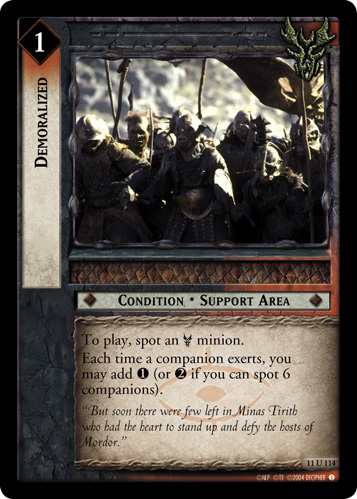 or the Madril, Defender of Osgiliath (15R64)
or the Madril, Defender of Osgiliath (15R64)
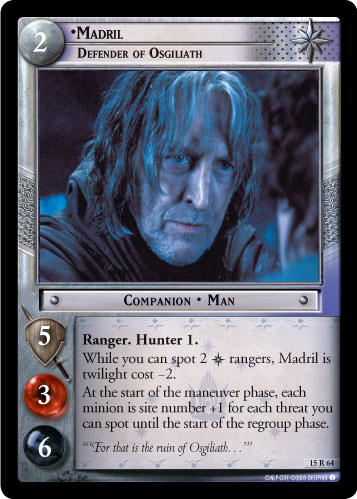 / Ithilien Blade (15C62)
/ Ithilien Blade (15C62)
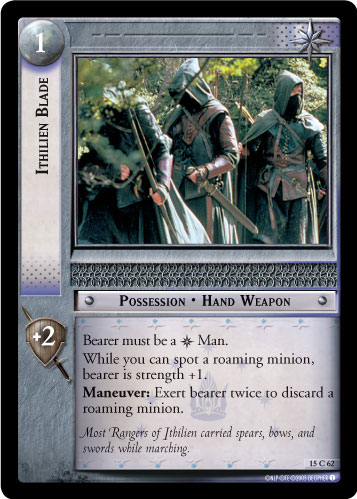 combo.
combo.
X-List
For the X-list in historical versions of Standard, see X-list or the articles for those formats.
The last Current Rulings Document defined the X-List for Standard Format as follows:
- All cards in sets 1-6, including Promotional cards originally printed in those sets
- Steadfast Champion (7U49)
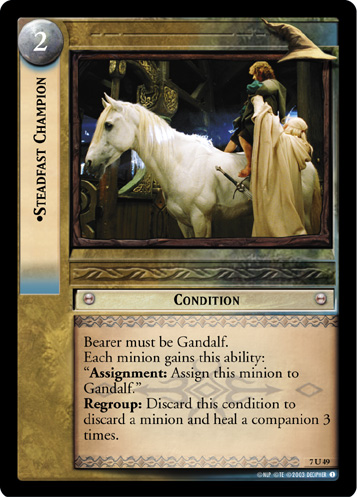
- Aggression (8C1)
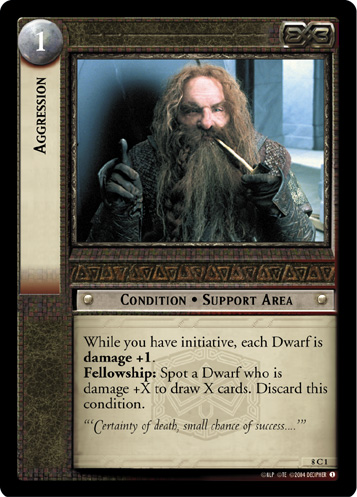
- Memories of Darkness (10U2)
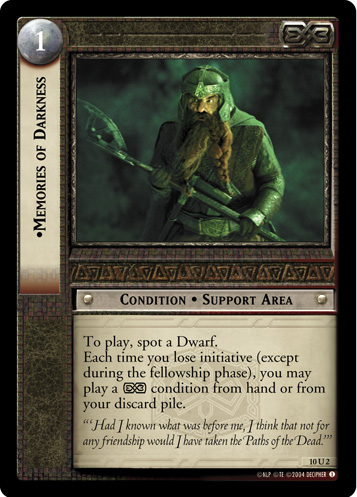
- Galadriel, Lady Redeemed (10R11)
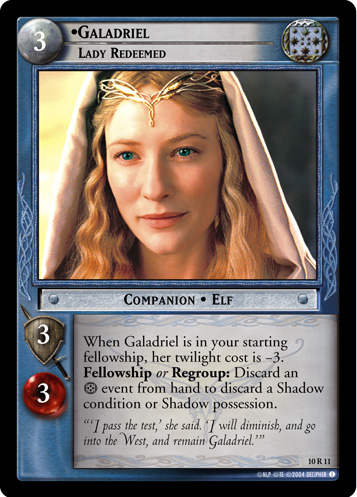
- Mordor Fiend (10C91)
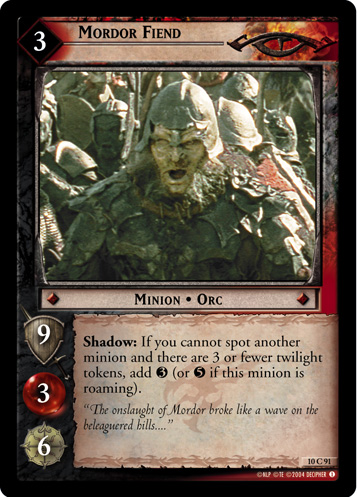
- Final Account (11C31)
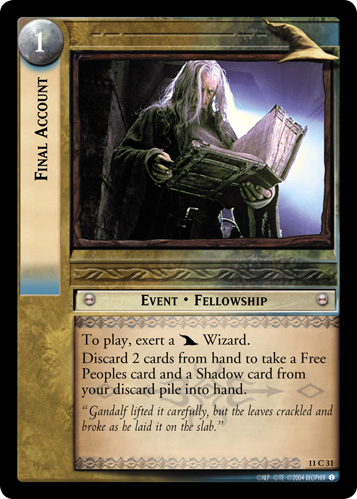
- Strange-looking Men (11R100)
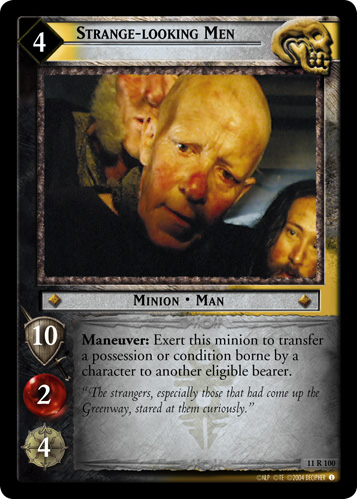
- Demoralized (11U114)

- Orkish Smith (11C132)
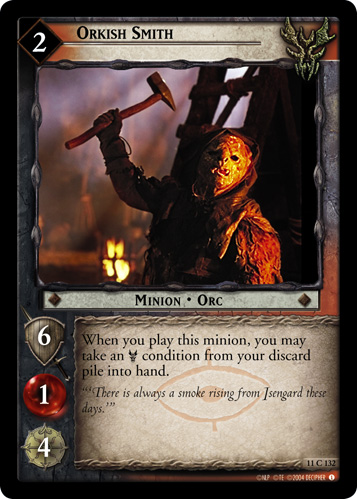
- Courtyard Parapet (13U188)
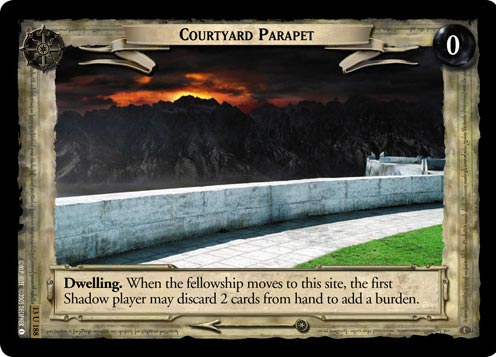
- Madril, Defender of Osgiliath (15R64)

| Formats |
|---|
| Sets | 1 | 2 | 3 | 4 | 5 | 6 | 7 | 8 | 10 | 9 | 11 | 12 | 13 | 14 | 15 | 17 | 18 | 16 | 19 |
|---|---|---|---|---|---|---|---|---|---|---|---|---|---|---|---|---|---|---|---|
| Historical Decipher Formats | Fellowship Block | Towers Block | King Block | War of the Ring Block | Hunters Block | ||||||||||||||
| Towers Standard | |||||||||||||||||||
| King Standard | |||||||||||||||||||
| Movie Block | |||||||||||||||||||
| War of the Ring Standard | |||||||||||||||||||
| Standard | |||||||||||||||||||
| Expanded | |||||||||||||||||||
| Open | |||||||||||||||||||
| Player's Council Formats (including PC Errata) | 1 | 2 | 3 | V1 | 4 | 5 | 6 | 7 | 8 | 9 | 10 | 11 | 12 | 13 | 14 | 15 | 16 | 17 | 18 | 19 |
|---|---|---|---|---|---|---|---|---|---|---|---|---|---|---|---|---|---|---|---|---|
| PC-Fellowship | ||||||||||||||||||||
| PC-Movie | ||||||||||||||||||||
| PC-Expanded | ||||||||||||||||||||
| Unofficial Formats | 1 | 2 | 3 | 4 | 5 | 6 | 7 | 8 | 10 | 9 | 11 | 12 | 13 | 14 | 15 | 17 | 18 | 16 | 19 |
|---|---|---|---|---|---|---|---|---|---|---|---|---|---|---|---|---|---|---|---|
| French | French | ||||||||||||||||||
| Austrian (Movie) | |||||||||||||||||||
| Austrian (Shadows) | |||||||||||||||||||
| Other Variants | |||||
|---|---|---|---|---|---|
| Sealed • Booster Draft • Cube Draft • Culture Shock • Highlander • Poor Man's • PC Errata | |||||